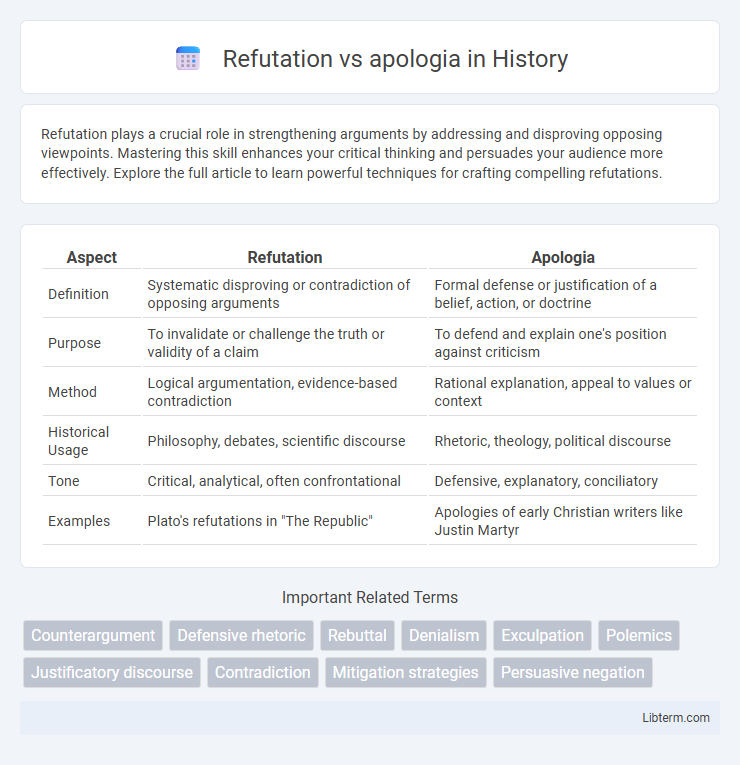Refutation plays a crucial role in strengthening arguments by addressing and disproving opposing viewpoints. Mastering this skill enhances your critical thinking and persuades your audience more effectively. Explore the full article to learn powerful techniques for crafting compelling refutations.
Table of Comparison
| Aspect | Refutation | Apologia |
|---|---|---|
| Definition | Systematic disproving or contradiction of opposing arguments | Formal defense or justification of a belief, action, or doctrine |
| Purpose | To invalidate or challenge the truth or validity of a claim | To defend and explain one's position against criticism |
| Method | Logical argumentation, evidence-based contradiction | Rational explanation, appeal to values or context |
| Historical Usage | Philosophy, debates, scientific discourse | Rhetoric, theology, political discourse |
| Tone | Critical, analytical, often confrontational | Defensive, explanatory, conciliatory |
| Examples | Plato's refutations in "The Republic" | Apologies of early Christian writers like Justin Martyr |
Introduction to Refutation and Apologia
Refutation and apologia are distinct rhetorical strategies used in argumentation and persuasion. Refutation involves directly disproving or contradicting opposing claims to weaken an argument's credibility. Apologia serves as a defensive speech or statement where the speaker justifies or explains their actions to defend against criticism or accusation.
Defining Refutation: Purpose and Techniques
Refutation aims to disprove or challenge an argument by presenting evidence or reasoning that contradicts the opponent's claims, thereby weakening their position. Key techniques include identifying logical fallacies, providing counterexamples, and highlighting inconsistencies within the original argument. The purpose of refutation is to demonstrate the invalidity or errors in opposing viewpoints, strengthening one's own stance in a debate or discussion.
Understanding Apologia: Meaning and Significance
Apologia refers to a formal defense or justification of a belief, action, or doctrine, aimed at clarifying misunderstandings and persuading an audience of its validity. Unlike refutation, which directly challenges opposing arguments, apologia emphasizes explanation and rationalization to restore credibility and maintain moral integrity. Its significance lies in fostering dialogue and reinforcing commitment through measured, reasoned responses in contentious debates.
Key Differences Between Refutation and Apologia
Refutation directly challenges and disproves opposing arguments by presenting counter-evidence and logical reasoning, aiming to invalidate the opponent's claims. Apologia, on the other hand, serves as a defensive speech or writing that justifies or explains a controversial position or action without necessarily disproving the opposition. The key difference lies in refutation's focus on negating opposition claims versus apologia's emphasis on self-defense and clarification.
Historical Contexts of Refutation and Apologia
Refutation and apologia have distinct roles in rhetorical traditions, where refutation directly counters opposing arguments by disproving or invalidating claims, often prominent in legal and philosophical debates since ancient Greece. Apologia, rooted in classical rhetoric and famously exemplified by Plato's "Apology," serves as a reasoned defense or explanation of one's actions or beliefs, historically significant in public speeches and writings during crises or accusations. Both practices evolved through cultural contexts, reflecting shifts in societal values and the nature of discourse in historical periods from antiquity to modern times.
Strategic Uses in Rhetoric and Communication
Refutation strategically dismantles opposing arguments by directly challenging their validity, enhancing credibility and persuading audiences through logical deconstruction. Apologia serves as a defensive strategy, where one justifies or excuses their actions to restore reputation and mitigate blame in rhetorical contexts. Both techniques play crucial roles in communication, with refutation emphasizing offense and apologia focusing on defense to influence audience perception effectively.
Common Structures in Refutational Arguments
Refutational arguments commonly follow a structured pattern beginning with a clear statement of the opposing claim, followed by evidence or reasoning that directly challenges the validity or accuracy of that claim. These structures often include identifying logical fallacies, presenting counter-evidence, and exposing contradictions within the opposing argument. Effective refutations prioritize clarity and relevance, ensuring each point systematically dismantles the core components of the adversary's position.
Elements of Effective Apologia
Effective apologia incorporates clarity, sincerity, and strategic acknowledgment of faults to restore credibility and trust. It uses ethos, pathos, and logos to appeal ethically, emotionally, and logically, fostering audience understanding and empathy. Clear structure with an opening statement, explanation, and closing reinforces accountability while guiding perception toward reconciliation.
Contemporary Examples: Refutation vs Apologia
Contemporary examples of refutation and apologia highlight distinct strategies in communication, particularly in political discourse and crisis management. Refutation directly counters opposing arguments with evidence, as seen in debates where politicians dismantle false claims through fact-checking and data presentation. Apologia, exemplified by public figures issuing statements to defend their actions or reputation, emphasizes justification and mitigation rather than outright denial or contradiction.
Conclusion: Choosing the Right Approach
Choosing the right approach between refutation and apologia depends on the context and goals of the communication, with refutation aiming to directly counter opposing arguments and apologia seeking to defend or justify a position. Refutation is most effective in debates or discussions where disproving false claims is essential, while apologia is better suited for situations that require restoring trust or addressing criticism. Understanding the audience and the nature of the conflict ensures the selection of a strategy that maximizes persuasion and credibility.
Refutation Infographic

 libterm.com
libterm.com